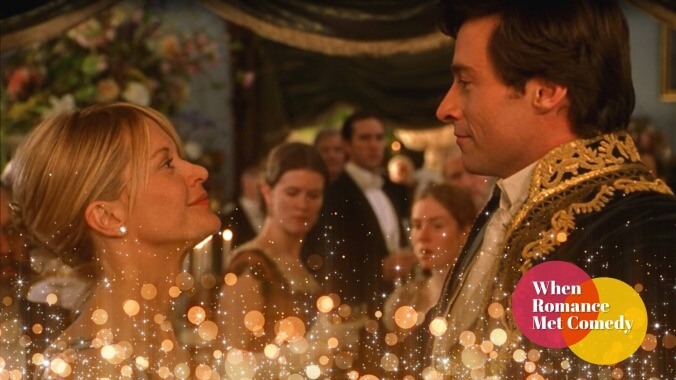Before there was Logan there was… the frothy, time-traveling rom-com Kate & Leopold?
Hugh Jackman first teamed up with director James Mangold as an aristocratic fish-out-of-water falling for Meg Ryan
Image: Graphic: Jimmy Hasse
Would you give up the right to vote in order to marry Hugh Jackman? That’s essentially the question at the heart of Kate & Leopold, a 2001 time travel rom-com about a sensitive 19th-century duke (Jackman) and the cynical modern day New Yorker (Meg Ryan) who winds up falling for him after he tumbles through a crack in time. And it’s a testament to just how good Hugh Jackman is in this movie that even the most ardent feminist might need a second to consider their options. By the time Ryan’s Kate McKay has made the impulsive choice to follow her out-of-time beau back to 1876, you kind of get it. Who needs airplanes, tampons, and access to penicillin when you can have Jackman take you in his arms and waltz you around a ballroom?
Yet the weirdest thing about Kate & Leopold isn’t anything that happens in its wacky time travel plot, which at one point involves Liev Schreiber falling several stories down an empty elevator shaft. It’s the fact that this gauzy romantic comedy was written and directed by James Mangold, who would later re-team with Jackman to make Logan, one of the bleakest, most critically respected superhero films of all time.
At first glance, there’s very little about Kate & Leopold that seems like a natural fit for Mangold’s filmmaking interests, which usually lean toward grizzled dad movies like 3:10 To Yuma, Walk The Line, and Ford V Ferrari. In fact, Mangold was specifically drawn to the idea of helming an escapist studio rom-com because he wanted a change of pace after bursting onto the scene with heavier dramas like Cop Land and Girl, Interrupted. But once you look past the waistcoats and candlelit rooftop dinners, you can actually start to see Mangold’s touch all over this frothy romance.
For one thing, Kate & Leopold is absolutely obsessed with men and their relationships to one another, a go-to subject matter for Mangold. The ensemble is rounded out with major roles for Kate’s scatterbrained ex-boyfriend Stuart (Schreiber), who figures out how to time travel and inadvertently brings Leopold back to the present; her skeevy boss J.J. (Bradley Whitford), who dangles a promotion and a potential romantic relationship as if they’re one and the same; and her boyish brother Charlie (Breckin Meyer), a struggling actor with a floundering love life. Weirdly enough, Mangold’s take on The Wolverine has more well-rounded female characters than this romantic comedy where the female lead has top billing in the title. There are whole stretches of the movie that leave Kate behind entirely to focus on Leopold and Charlie’s burgeoning friendship, as the old-fashioned duke teaches his modern-day counterpart some lessons in how to successfully court a woman.
While other time travel rom-coms have used their central conceits as metaphors for everything from marriage to maturation, Mangold is interested in shifting ideals of masculinity. The initial fish-out-of-water comedy of Leopold’s arrival in modern-day New York gives way to a study in contrasts between the immature, emotionally stunted men of the present and the noble confidence of a man from the past—whose chivalry isn’t a means to an end, but a genuine code for trying to be a better, more caring person. Kate & Leopold isn’t interested in manhood as it relates to machismo swagger or bro-y gross-out humor, but as it relates to ideals of integrity, honesty, respect, and, most unexpectedly of all, emotional openness. Leopold’s biggest piece of advice to Charlie is that he shouldn’t awkwardly half-flirt with his crush while trying to suss out her interests. “Make your intentions known,” Leopold advises. “Think of pleasing her, not vexing her.”
Of course, it’s wildly ahistorical to think that the person best-suited to teach us how to live sensitive, respectful 21st-century lives is an aristocratic man from the 1800s—even if Leopold is supposed to be a forward-thinking inventor who goes on to patent the elevator. In a lot of ways, it probably would’ve made more sense for Kate & Leopold to be a Thor-style comedy where the displaced outsider learns his lesson, rather than an Enchanted-style story where they change the world around them for the better.
But as Mangold repeatedly points out in the film’s DVD commentary, Kate & Leopold isn’t actually about contrasting the 1870s with the 2000s so much as paying homage to an Old Hollywood style of romantic filmmaking. Beyond its overt nods to Breakfast At Tiffany’s, Kate & Leopold has a dreamily timeless quality that evokes movies like The Apartment and The Shop Around The Corner.








































